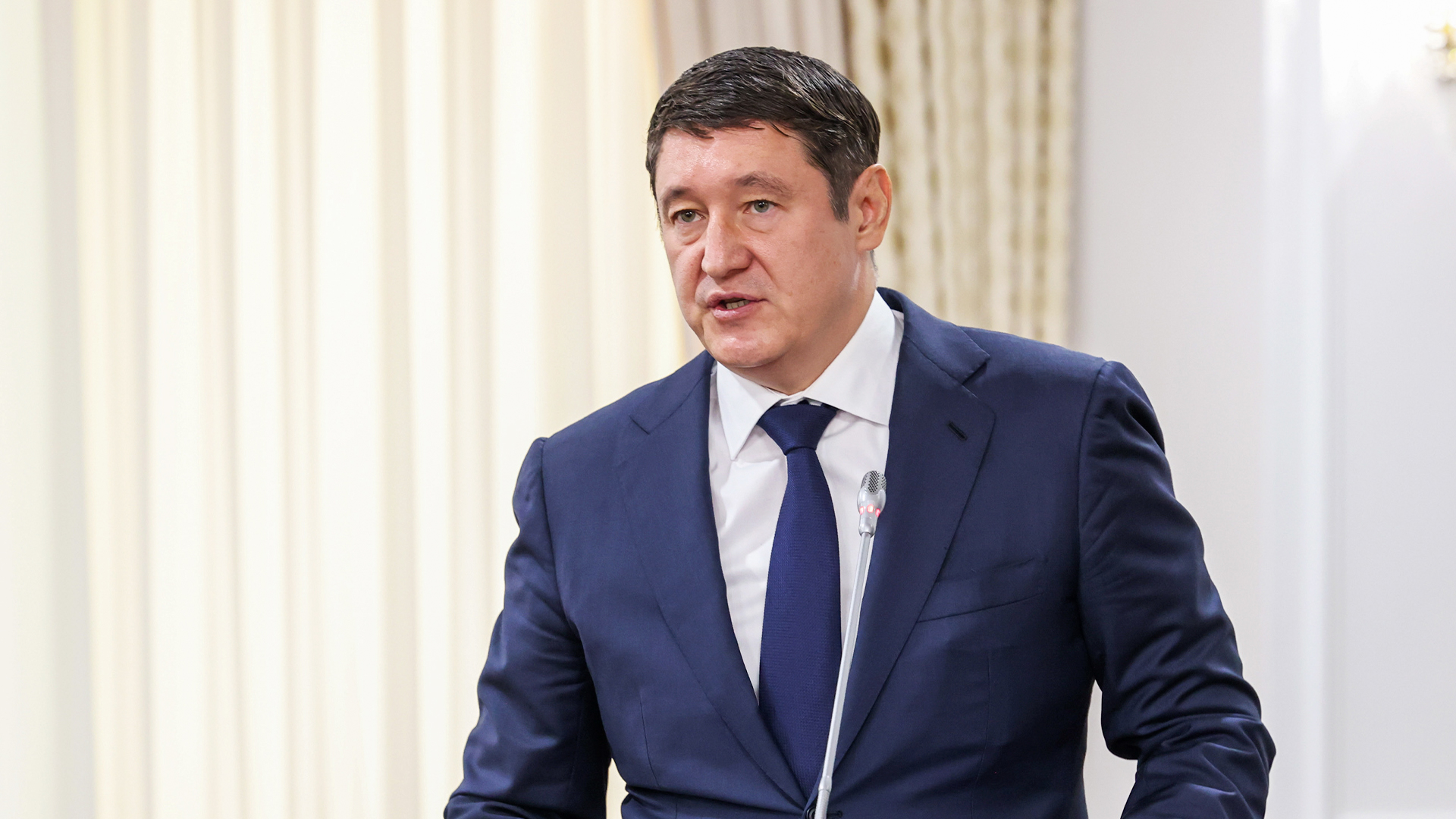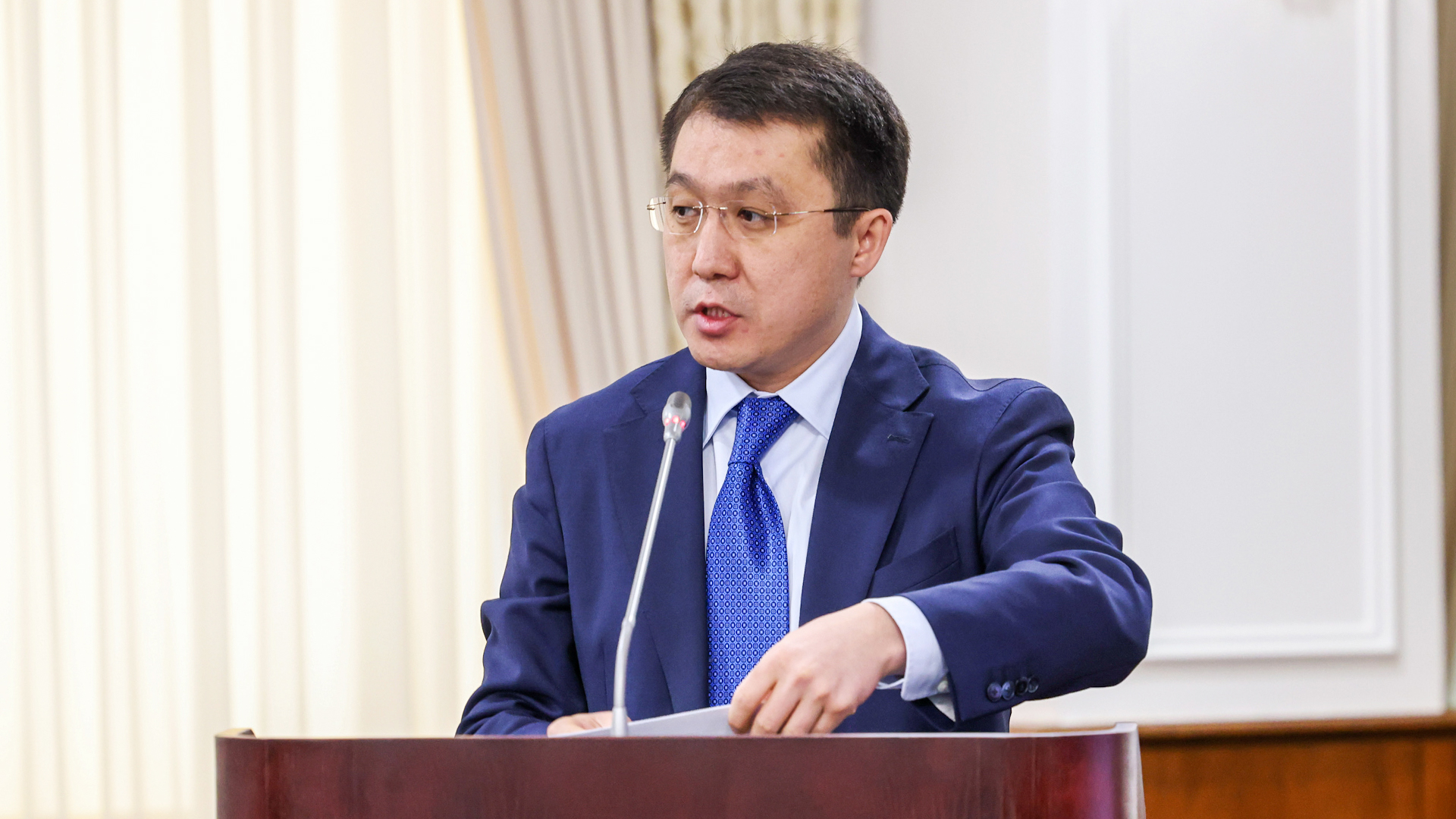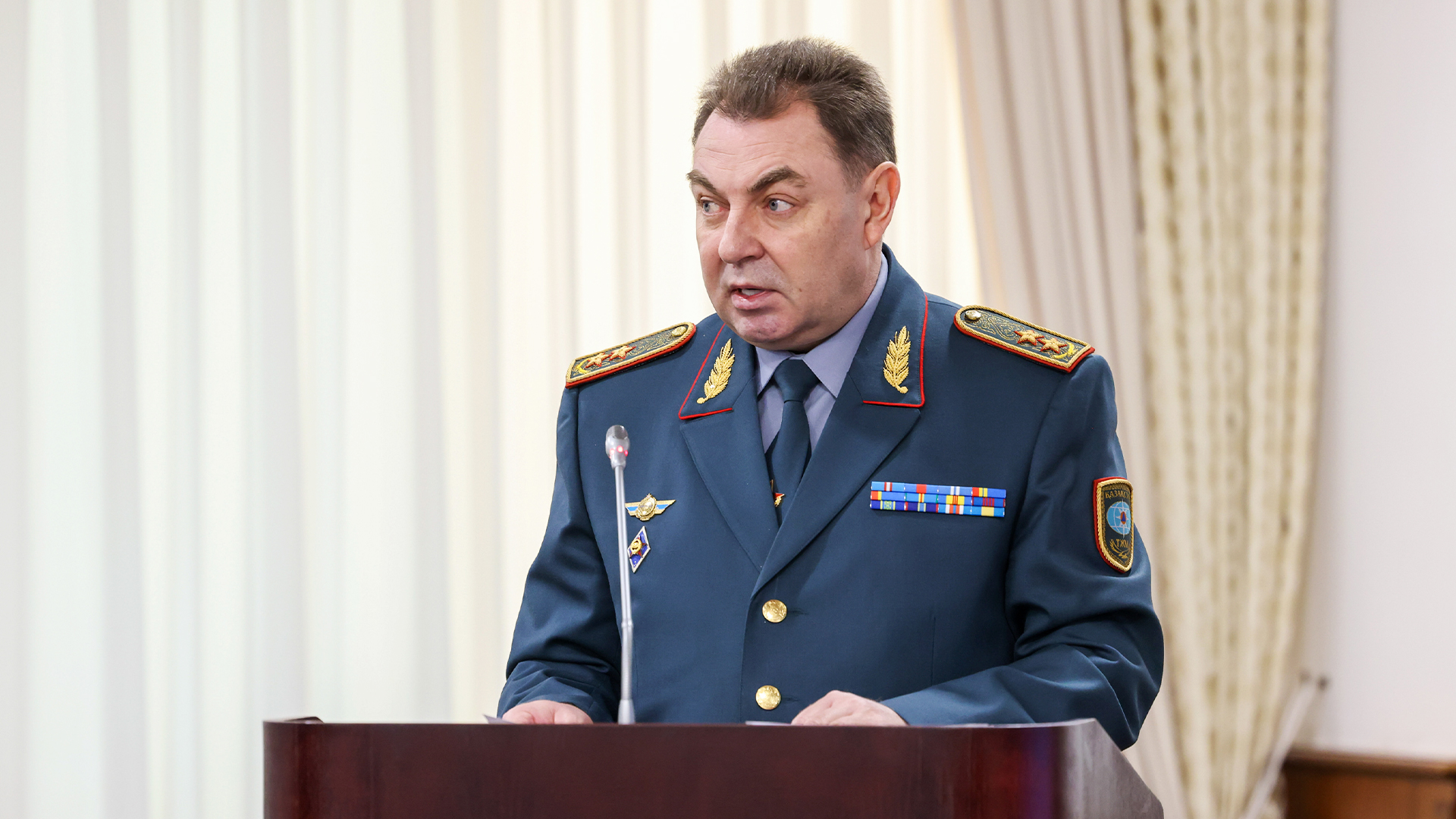11 April 2023, 14:50
 At the Government session, chaired by Prime Minister Alikhan Smailov, the issue of preparations for the upcoming heating season was discussed. The newly appointed Minister of Energy Almassadam Satkaliyev, the heads of the Ministries of Industry and Infrastructural Development Marat Karabayev and Emergency Situations Yuri Ilyin, as well as akims of several regions made presentations on the topic.
At the Government session, chaired by Prime Minister Alikhan Smailov, the issue of preparations for the upcoming heating season was discussed. The newly appointed Minister of Energy Almassadam Satkaliyev, the heads of the Ministries of Industry and Infrastructural Development Marat Karabayev and Emergency Situations Yuri Ilyin, as well as akims of several regions made presentations on the topic.
The meeting began with the swearing in of Almasadam Satkaliyev as Minister of Energy. Then the head of the government A. Smailov and members of the Cabinet of Ministers heard his report on the situation in the country's thermal energy sector.
Thus, first of all, Satkaliyev noted a number of problematic issues in the context of the regions.
"At the end of October last year, serious emergencies started at the Ridder CHP plant with a significant drop in the temperature of the heating network. In January this year, there was a fire in the conveyor belt galleries and the control panel of boiler No.6. In March of this year, there was thermal damage to cables at boiler number 5 and coal dust explosion near boiler number 6 with partial destruction of envelope structures," the Minister of Energy informed, noting that since the beginning of the heating period, 133 cases of non-compliance with the temperature regime of the heating network operation occurred.
He also added that the existing debt to Karazhira JSC for the supplied coal amounting to about 1.5 billion tenge was affecting the stable supply of fuel. Investigations and unscheduled inspections have been carried out on these facts with the drawing up of protocols for penalties.
On 27 November this year there were numerous failures on Ekibastuz heating networks. The temperature schedule was not complied with 94 times. The Committee of Nuclear and Energy Supervision and Control of the Ministry of Energy conducted an investigation into the technological violation and an unscheduled inspection of Ekibastuzteploenergo LLP with the imposition of administrative penalties. Satkaliyev noted that the existing penalties are very small compared to the damage caused to the population.
Since the start of the heating season, there have been 70 cases of non-compliance with the temperature schedule at TPP-2 of ArcelorMittal Temirtau JSC. In January, the gas duct collapsed at boiler No. 3 due to the deterioration of the ash collector. At present, the gas duct on boiler №3 is still being repaired, as a result of which boiler №1 has been taken out for repairs with a one-week lag. In order to ensure reliable heat supply to consumers in Temirtau, boiler №7 is under construction with a lag. It is necessary to put this boiler into operation by the next heating season.
"At the Zhezkazgan TPP of Kazakhmys Energy LLP there were 75 emergency shutdowns for the six boilers available during the heating period. The largest number was in boiler No. 9, but no major repairs are planned for this year with reference to funding. Given that Zhezkazgan has the status of a regional centre, the Ministry is working with Kazakhmys Energy LLP to modernise this CHP," Almassadam Satkaliyev said.
In December and January, there was a critical situation with the water supply to MAEK LLP. As Mangistau is a region where energy is a critical issue, it is necessary to ensure that the planned repair campaign is carried out in full and on time.
In addition, there have been no major repairs of Kentau TPP's boilers since 2012. This year it is planned to overhaul 4 boilers and 1 turbine at a cost of about 5 billion tenge. Since the beginning of the heating season, 403 cases of failure to meet the temperature schedules of heating networks have been registered. There are 2.7 mln tons of coal and 109,000 tons of fuel oil in the warehouses of the energy sources. At the same time, fuel reserves at the above enterprises in the East Kazakhstan, Akmola, Karaganda, Pavlodar regions and Almaty city are below the norms.
An important problematic issue is the significant amount of payables of energy producing organisations for fuel. For example, the debt of energy producing organisations to KazTransGas-Aymak JSC is 12 billion 702 million tenge, and to Bogatyr-Komir LLP is 6 billion 437 million tenge.
The Ministry has completed a technical audit of power plants. The rating was compiled based on the following key indicators: wear and tear, running hours of major equipment, specific fuel consumption rates, staffing levels, efficiency, process disturbances and implementation of repair programmes. International consultants KPMG India visited all power plants. A financial report is being generated and further action items are being prepared.
"According to these criteria, power plants are ranked. Roadmaps for preparing all 37 cogeneration plants are being drawn up jointly with the akimats and will be monitored by the ministry," Almassadam Satkaliyev said.
According to the schedule approved by the System Operator, 10 power units, 49 boilers and 54 turbines are scheduled to be repaired at the power plants this year. Repairs are already underway at different stages at one power unit, two boilers and three turbines. There is a failure to start repairs of the main equipment of power plants in Karaganda, Mangistau regions.
On the electricity grid, repairs are planned for transmission lines with a total length of 25,000 km, as well as 564 high-voltage substations. Electricity grid repairs will start according to approved schedules in May.
At the end of his speech, the Minister of Energy listed the measures necessary for successful preparation for the coming autumn-winter period 2023-2024, namely:
1. to ensure that the necessary amount of funding is available for renovation work;
2. to prevent a reduction in the planned scope of repair work, including on buildings and structures;
3. to establish a standard stock of fuel and spare parts;
4. to conduct emergency drills with personnel.
 The Minister of Industry and Infrastructural Development Marat Karabayev then gave a report on the work done and plans for the forthcoming heating season.
The Minister of Industry and Infrastructural Development Marat Karabayev then gave a report on the work done and plans for the forthcoming heating season.
For example, by 2022, Kazakhstan will have produced 113.9m tonnes of coal, an increase of 2% over 2021, he said.
In order to prepare for the upcoming 2023-2024 heating season, the Ministry developed and sent to local executive bodies an action plan to provide coal to budgetary organizations and population with deadlines. In order to avoid a shortage of utility coal during the upcoming heating period, preventive measures are being taken to limit coal removal by road and rail transport, except for coal mining companies.
"The experience of the past period showed that at the peak of the heating season, there was an outflow of social coal from the points of sale. Thus, in five regions of the country the outflow amounted to about 400 thousand tons of coal. Due to the lack of control by the akimats, a number of regional operators began to sell social coal not for its intended purpose, i.e. to businesses. During the 2022-2023 heating season, according to the data of the Republican Crisis Centre of the Ministry of Emergency Situations, 185 technical breakdowns occurred in the life-support system of the population. This is mainly due to the deterioration of engineering and communication networks," Karabayev noted.
According to operational data from local executive bodies, the total length of heating networks was about 14,000 km in 2022. The average wear and tear of the networks in the country is 54%. The highest wear and tear remains in Pavlodar, Abay, Karaganda, East Kazakhstan and North Kazakhstan regions.
The Ministry of Industry and Infrastructural Development implements three financing mechanisms for the modernisation of communally owned heat networks:
A budget programme for the allocation of targeted transfers from the national budget has been opened for the financing of heating networks. At the same time, financing will be continued through a budget loan mechanism at 0.01% for 20 years, and for private organisations a subsidy mechanism.
For 2023, 69.4 billion tenge has been allocated from the national budget for the implementation of 47 projects with a depreciation rate of over 75%. These funds will be used to reconstruct about 107 km of heating networks. The overall objective is to reduce the depreciation of heating networks to 43% by 2029.
Marat Karabayev said that local executive bodies need to intensify work on the provision of appropriate applications and documentation of heat supply projects. Today in the formation of the national budget for 2024 there are applications only for 43 heat supply projects worth 54.7 billion tenge.
On 15 March this year, a positive conclusion on the reconstruction of 4 heating mains in Ekibastuz city for a total amount of about 9.6 billion tenge and on the new construction of heating networks in Pavlodar city for 4.4 billion tenge was received. Also for the cities of Stepnogorsk and Kokshetau, the Akim of Akmola Region has submitted an application for repair of heating networks.
In preparation for the forthcoming heating season, in order to ensure a reliable heat supply, the local executive bodies of the regions, Almaty, Astana and Shymkent cities, together with the relevant authorities, need to:
1) after the end of the heating season, develop and approve an action plan for the preparation of all housing and social sector facilities and formulate correct plans for the coal requirements for the forthcoming 2023-2024 heating season;
2) by 1 June this year, carry out a technical survey of the condition of the heating networks and consider the expediency of transferring private networks to municipal ownership;
3) complete the design and estimate documentation by the end of this year to ensure construction and installation work in 2024;
4) start storing coal reserves at stubs and coal pits in the summertime;
5) ensure a transparent operation of the trading exchange and an even distribution of volumes.
 Yuri Ilyin, Head of Kazakhstan's Ministry for Emergency Situations, reported on how the safe operation of dangerous technical devices is supervised at enterprises supplying heat and electricity.
Yuri Ilyin, Head of Kazakhstan's Ministry for Emergency Situations, reported on how the safe operation of dangerous technical devices is supervised at enterprises supplying heat and electricity.
For example, he said, the ministry currently controls seven industrial enterprises, which are located in Aktobe, Pavlodar, Karaganda and Mangistau regions.
"According to the schedule of preventive control and supervision for the first half of this year, an inspection of CHPP-1 of Aluminium Kazakhstan JSC and the PVS CHPP of ArcelorMittal Temirtau JSC is being carried out. The Aksu Ferroalloy Plant, a branch of TNK Kazchrome, is scheduled to be inspected in May. In the second half of the year, checks are planned for Nova Zinc, the Donskoy GOK - a branch of TNK Kazchrome in Khromtau, and Ekibastuzskaya GRES-2," the Minister said.
He also noted that recent emergencies in Ridder and Ekibastuz show that accidents mainly occur due to lack of long-term planning for repair and modernisation of main and auxiliary equipment, their untimely technical inspection and partial replacement of heating surfaces instead of their complete replacement.
Concerns include limited capacity of boiler and auxiliary equipment due to their wear and tear, lack of reserve capacity to ensure stable operation of heat and power facilities with peak loads, proper production control by the management of energy companies and low qualification of contractors' staff involved in repair work. Along with this, boilers are operated with non-design fuel and insufficient funds are allocated for technical diagnostics, repairs and replacement of boiler components in full.
For the stable passage of the heating periods, the akimats need to take special control of energy companies and main heat supply pipelines with a high degree of danger, to respond promptly to emergency situations, and to continue working with energy companies to eliminate the causes of heat supply interruption to consumers due to the condition of utility networks.
Yuri Ilyin drew particular attention to the need for the heads of akimats and energy enterprises to inspect production buildings, roofing and chimney elements for reliability, resistance to wind loads and their repair.
"During the heating season, special attention should be paid to the observance of the rules of operation of gas equipment by citizens. As a body responsible for inter-sectoral coordination in the field of civil protection, we analysed the work of the housing inspections in the field of gas and gas supply under the akimats. The analysis showed that the housing inspectorates do not adequately implement their functions of control in the area of gas and gas supply. For example, in the Schedule of Preventive Control and Supervision for the first half of this year, posted on the website of the General Prosecutor's Office, there are no inspections of housing inspections. A similar situation occurred last year. Of the 29 inspections carried out by housing inspectorates in 2022, only one is planned and the rest are based on requests from applicants," the head of the Ministry for Emergency Situations said.
In this connection, to reduce the risk of emergencies as much as possible, he added, it is necessary for all the state and local executive bodies concerned to fulfil their powers within the framework of the existing legislation.
Then Prime Minister Alikhan Smailov listened to the reports of akims of Pavlodar, Kostanay, East Kazakhstan and Akmola regions on the session
As reported by Yermek Marzhikpayev, head of Akmola region, the heating season in the region is proceeding normally and is nearing completion. Heat sources are operating stably.
"For the city of Stepnogorsk, critical sections of heating networks with a length of 30 km have been identified and taken into municipal ownership of the city. The issue of allocation of 5 billion tenge is being worked out by the regional Akimat together with the Construction Committee. With private funds will be carried out repair of heating power plant equipment and heating networks in the amount of about 5 billion tenge," he said.
In general, about 4 billion tenge is allocated from the regional budget for the repair campaign to ensure the quality of the upcoming heating season. Within the allocated funds, 29 boiler houses and 13 km of heating networks will be repaired.
In addition, more than 5 billion tenge has been allocated for the implementation of 10 projects for the construction and reconstruction of heating networks and the heat source. These funds will be used to build and reconstruct about 21 km of networks and one boiler house.
More than 300 million tenge has been allocated from the region budget to carry out a technical inspection of about 1,000 heating networks as part of an order from the Head of State.
The issue of allocating 3.7 billion tenge from the government reserve has been worked out together with the line ministries to carry out the repair campaign of the regional centre.
Stay updated about the events of the Prime Minister and the Government of Kazakhstan - subscribe to the official Telegram channel
Subscribe